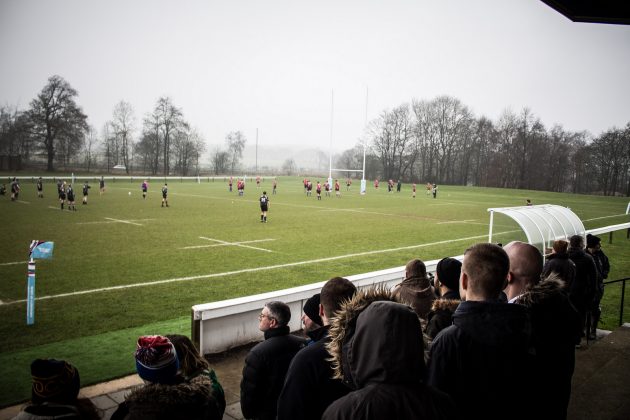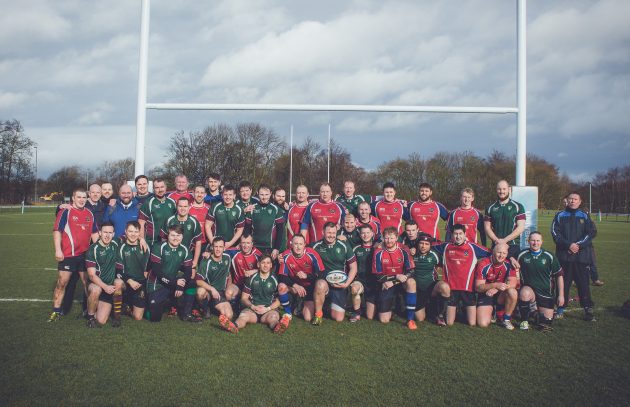By Rachel King
It was a cold day for making history on Saturday. There are more mugs of tea than pints on the sidelines as spectators stamp their feet and hunch their shoulders against the drizzling northern rain. The crowd looks unusually large for a small amateur club, the only hint that this might be something special – apart from the rainbow hats and feather boas bobbing around.
Despite the weather’s best efforts, spirits are high and the newly formed Leeds Hunters step out to cheerful applause, becoming Yorkshire’s first-ever inclusive rugby team to play a match.

Smiling in the rain: supporters cheer the team on (Photo: Philip Faryna)
Given that gay, bisexual and straight men train with the Hunters, ‘inclusive’ in this instance could seem like just semantics. But having that principle means a great deal to the team’s founder Rob Wilson: “It’s a safe space for people having the inclusive thing,” he explains. “People have historically had quite bad experiences in sport with homophobia and biphobia in schools in PE, so it gives them an opportunity to get involved with it again and have the positive experience.”
It’s a sentiment echoed by Leeds city councillor James Lewis: “Traditionally LGBT people may not have felt comfortable playing in some sports teams. So giving people the opportunity to be part of an inclusive sports team is a really important part of actually encouraging people to be physically active.”

L to R Cllr James Lewis, Team Founder Rob Wilson and Cllr Jonathan Pryor (Photo: Philip Faryna)
Recent years have been a mixed bag for LGBT inclusion in rugby. An increasing number of big names like James Haskell, Gareth Thomas and David Pocock are publicly making a stand against homophobia in rugby. Joining the likes of Andrew Purchas and Nigel Owens who’ve been advocating for LGBT inclusion in the sport for years. In addition, campaigns like Stonewall’s Rainbow Laces or World Rugby’s pledge to end homophobia have steadily gained traction and are creating a better awareness of the problem.
On the flip side however, for every leap forward there seems to be another high profile incident of homophobic abuse. Two fans received bans from Twickenham in 2014 for aiming homophobic abuse at Owens while he refereed England’s 24-21 defeat by New Zealand. On the other side of the world in 2015 Pocock complained to referee Craig Joubert during a Brumbies match about members of the opposition using homophobic slurs.
And this is the tip of the iceberg. Examples like these only come to light because the world is watching. The full extent to which homophobia, biphobia and transphobia prevents people from getting involved with rugby is difficult to assess, although large studies like Out On The Fields paint a pretty damning picture.

Very chilly: supporters brave the cold to watch the match (Photo: Philip Faryna)
In an ideal world there’d be no need for inclusive sports teams like the Hunters, but we’re not in that ideal world yet. Adam Holland, 29, came to train with the team having not picked up a rugby ball since his school days. When asked if he thinks there’s really a need for inclusive sports teams his answer is firm.
“Absolutely,” he says. “Now more than ever and with Keegan Hirst (the Wakefield Trinity prop currently playing in Super League) coming out recently it’s really pushing forward on how important it is to be who you are and do what you want to do.
“There’s no reason why anyone shouldn’t play rugby no matter what sex, race or gender you are. What’s important is that everyone who wants to play it, can.”

Back in the game: 18 year old Edward Shaw after his first match in four years (Photo: Philip Faryna)
Edward Shaw, 18, is playing his first rugby match in four years after joining the Hunters. “This is the only one in Leeds that’s an inclusive team and it’s so important for the LGBT community” he says.
“We’re a minority as it is, so it’s really important to come together as one and be supportive whatever it is, through rugby, Pride, anything.”
Like Edward and Adam many of the Hunters hadn’t played in years before joining. Some had never played at all. But on a dreary January morning at the Weetwood ground, after a roller coaster nine weeks training, they line up in kit borrowed from Leeds Uni to play Yarnbury Fifth XV. They lose 36-3 but it’s still all smiles as they troop off the pitch, one more team in the rugby family.






